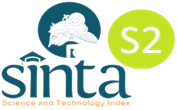MODEL STAD (STUDIENT TEAMS ACHIEVEMENT DEVISION) DALAM MENINGKATKAN HASIL BELAJAR COGNITIF SISWA
DOI:
https://doi.org/10.33477/bs.v2i2.379Abstract
Berdasarkan hasil penelitian dan pembahasan dapat disimpulkan bahwa “Ada peningkatan hasil belajar peserta didik pada konsep sistem pernapasan di kelas XI IPA 4 SMA Negeri 11 Ambon melalui penerapan model STAD (Studient Teams Achievement Devision) sebesar 66.4%”. Kata kunci: stad, cognitif, siswaReferences
Arikunto, Suharsimi. 2002. Dasar-Daras Evaluasi Pendidikan. PT Bumi Aksara. Jakarta.
---------. 2002. Prosedur Penelitian Suatu Pendekatan Praktek. PT. Remaja Rosdakarya. Jakarta.
De Porter, Bobbi & Mike Hernacki. 2007. Quantum Lerning: Membiasakan Belajar Nyaman dan Menyenangkan. Mizam Pustaka. Bandung.
Ihsan, Fuad. 2010. Dasar-Dasar Pendidikan. Rineka Cipta. Jakarta.
Achmad Zulfah & Juwono. 2003. Biologi Sel. Penerbit Buku Kedokteran. Jakarta.
Sabri, Ahmad. 2005. Strategi Belajar Mengajar Micro Teaching. Quantum Teaching. Jakarta
Sharan, Shlomo. 2009. Haanbook of Cooperatif Learning. Imperium. Yogyakarta.
Slameto. 2003. Belajar dan Faktor-Faktor Yang Mempengaruhinya. Rineka Cipta. Jakarta.
Slavin, Robert E.,. 2010. Cooperatif Learning: Teori, Riset dan Praktek. Nusa Media. Bandung.
Sobur, Alex. 2003. Psikologi Umum. Pustaka Setia. Bandung.
Sudjana, Nana.2001. Penilaian Hasil Proses Belajar Mengajar. PT Remaja Rosdakarya. Bandung.
Yoni, Acep. 2010. Menyusun Penelitian Tindakan Kelas. Familia. Yogyakarta.
Downloads
Published
Issue
Section
License
Authors who publish with this journal agree to the following terms: Authors retain copyright and grant the journal right of first publication with the work simultaneously licensed under a Creative Commons Attribution License that allows others to share the work with an acknowledgement of the work's authorship and initial publication in this journal. Authors are able to enter into separate, additional contractual arrangements for the non-exclusive distribution of the journal's published version of the work (e.g., post it to an institutional repository or publish it in a book), with an acknowledgement of its initial publication in this journal. Authors are permitted and encouraged to post their work online (e.g., in institutional repositories or on their website) prior to and during the submission process, as it can lead to productive exchanges, as well as earlier and greater citation of published work.














